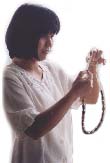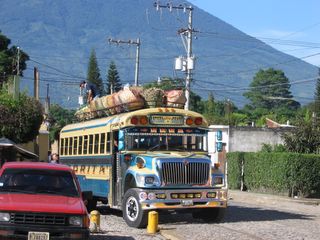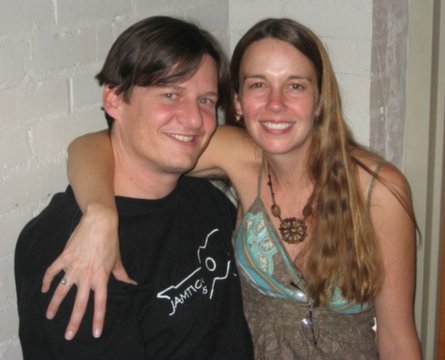
The finca community includes a complex of buildings where 40 families live. There is a small church and even buildings where they educate their children.
On the weekend of September 10-11 we visited the Finca Nueva Alianza. "Finca" is Spanish for "plantation" or "estate", and there are a large number of these fincas in Guatemala, producing mostly coffee, sugar and bananas. This particular finca produces both coffee and macadamias, but what sets it apart from others and makes it really worth visiting is a combination of three things:
1.) its fascinating story of how the workers, previously abused and underpaid, used the legal process to take over the finca from its negligent landlord and create a worker-owned co-operative (learn more about this fascinating history here);
2.) its new projects for producing energy (cooking fuel and biodiesel) from renewable (non-petroleum) resources; and
3.) its eco-tourism project to provide tours, nature hikes, volunteer opportunities, home-cooked meals and hostel arrangement to spend the night, all for a very nice price (150 Quetzales each for the weekend, or about $20, which includes 4 meals).

Our crew loads up in the pickup truck for the long bumpy ride up the dirt road to the finca. (Carley is in the middle)

Carley and Kina entertain the reporters from Prensa Libre (Free Press - that's free as in liberated, not free as in free of charge), Guatemala's biggest newspaper. They were here to write an article about the finca, which ran in the September 19 edition. (Click here to see the article and photo)

As part of our weekend stay, we got to hike through the verdant jungle to a nearby waterfall.

At the waterfall, we learned how to use some of the local vegetation as umbrellas. The locals also eat the leaves of these plants, called quequexte (pronounced kay-KESH-tay). Back at the farmhouse, they served us lunch which included a soup containing these flavorful leaves.

The nature hike continues across the stream...

...and past the coffee bushes, through the vines...

...along an irrigation canal...

...to yet another waterfall!

We had an incredible view of the local volcanoes Santa Maria (large, background) and Santiaguito (small, foreground, erupting). On the other side of Santa María is our home city, Quetzaltenango (Xela).

Looking the opposite direction from the volcanoes, we could see over the coast almost all the way to the Pacific Ocean. This was the view from the beautiful patio dining area.

Here we are about to enjoy our breakfast of home-cooked Guatemalan food.

The patio also included this "game table" with chess, backgammon and checkers boards painted on to the table. The game pieces are actually painted halves of macadamia nuts (thanks to Ben, the volunteer from Australia on the right in the photo).

As part of the Saturday evening festivities, some members of the community performed a concert on the marimba, while one of the locals is happy to have a chance to dance with Carley.

The local boys running around the finca were very friendly and cute.

These cute little chicks were running around our area as well.

One of the primary sources of income at the farm is macadamia nuts. Here Elizabeth (new editor of the local progressive newspaper Entre Mundos) displays a macadamia. First you have to remove the soft green outer shell, and then crack the really hard brown inner shell.

This machine is rather effective at taking off the soft green outer shell.

These nuts still need to be cracked.

The process of extracting the tasty white macadamia nugget from the hard brown shell is a little more difficult.

We didn't get to witness any of the coffee production, since the coffee harvest doesn't start until October. However we did get a tour of the primitive facility where they prepare the coffee beans for market (mostly just washing and drying in this facility).

The Finca has also recently started up a new water purification plant to provide bottled drinking water to the local communities.

The inner workings of this facility turned out to be really quite simple - just a few filters and an ionizer.

In addition to coffee and macadamias (the money-earners), plenty of other fruits and vegetables abound here to provide food for the community. Here is a group of small papaya trees outside the room where we slept.

Overall, we really enjoyed our weekend at the Finca, and Rob even made a new friend. (His name is Surprise!)
Check out some other side-trips around Xela




